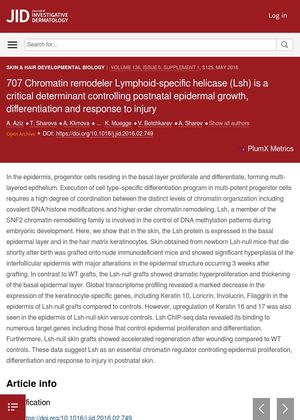Chromatin Remodeler Lymphoid-Specific Helicase (Lsh) Is a Critical Determinant Controlling Postnatal Epidermal Growth, Differentiation, and Response to Injury
April 2016
in “
Journal of Investigative Dermatology
”
Lymphoid-specific helicase Lsh chromatin-remodeling protein epidermis hair matrix keratinocytes hyperplasia interfollicular epidermis hyperproliferation basal epidermal layer keratinocyte-specific genes Keratin 16 Keratin 17 epidermal proliferation epidermal differentiation skin regeneration post-wounding wound healing

TLDR Lymphoid-specific helicase (Lsh) is crucial for skin growth, change, and healing after injury.
The study from April 2016 investigated the role of Lymphoid-specific helicase (Lsh), a chromatin-remodeling protein, in the growth, differentiation, and injury response of the epidermis. Lsh was found to be expressed in the basal epidermal layer and hair matrix keratinocytes. Skin from newborn Lsh-null mice, which were grafted onto immunodeficient mice, showed significant hyperplasia of the interfollicular epidermis and major structural alterations 3 weeks post-grafting. These grafts also showed hyperproliferation and thickening of the basal epidermal layer, unlike wild-type grafts. Transcriptome profiling revealed decreased expression of keratinocyte-specific genes in Lsh-null grafts, but increased expression of Keratin 16 and 17. Lsh was found to bind to numerous target genes controlling epidermal proliferation and differentiation. Lsh-null skin grafts also showed accelerated regeneration post-wounding. These findings suggest that Lsh is a critical regulator of epidermal proliferation, differentiation, and injury response in postnatal skin.
